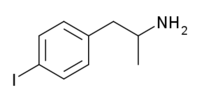para-Iodoamphetamine
para-Iodoamphetamine (PIA), also known as 4-iodoamphetamine (4-IA), is a research chemical of the phenethylamine and amphetamine chemical classes.
 | |
| Identifiers | |
|---|---|
| |
| CAS Number | |
| PubChem CID | |
| ChemSpider | |
| CompTox Dashboard (EPA) | |
| Chemical and physical data | |
| Formula | C9H12IN |
| Molar mass | 261.106 g·mol−1 |
| 3D model (JSmol) | |
| |
| |
| (verify) | |
It acts as a selective serotonin releasing agent and is also a MAOI.[1]
PIA is rumored to be a serotonergic neurotoxin on the account of that being reported to be the case for para-chloroamphetamine.
However, PIA is a much weaker 5-HT neurotoxin than is the case for PCA.[2]
Analogs
5-IAI was an attempt to make a non-neurotoxic analog of PIA.
gollark: ++delete all operating system development
gollark: > strings prefixed by the length are bad because you cant take a subset of the string by just adding an offset to the pointer and have it be a valid stringWait, you can't really do that anyway with null-terminated ones if you want a subset of fixed length.
gollark: You shouldn't do that. That would possibly cause so many memory issues.
gollark: I mean, to be honest I somewhat agree, it introduces so many convoluted problems and if it wasn't for the fact that many people need Unicode to meaningfully type and such on computers I would probably not want it.
gollark: WHAT.
References
- Marona-Lewicka D, Rhee GS, Sprague JE, Nichols DE (December 1995). "Psychostimulant-like effects of p-fluoroamphetamine in the rat". European Journal of Pharmacology. 287 (2): 105–13. doi:10.1016/0014-2999(95)00478-5. PMID 8749023.
- Nichols DE, Johnson MP, Oberlender R (January 1991). "5-Iodo-2-aminoindan, a nonneurotoxic analogue of p-iodoamphetamine". Pharmacology, Biochemistry, and Behavior. 38 (1): 135–9. CiteSeerX 10.1.1.670.504. doi:10.1016/0091-3057(91)90601-W. PMID 1826785.
This article is issued from Wikipedia. The text is licensed under Creative Commons - Attribution - Sharealike. Additional terms may apply for the media files.